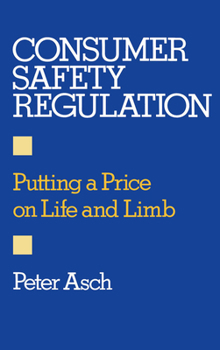Consumer Safety Regulation: Putting a Price on Life and Limb
Advocates of consumer safety regulation, an active and controversial area of public policy in the United States, contend that markets do not adequately protect the interests of vulnerable consumers; market traditionalists respond that public agencies increasingly make risk/safety decisions that individual citizens ought to be making for themselves. This book, written by an economist, critically assesses the rationales for, and the effects of, our major consumer safety programs. Addressed to a general audience, and incorporating relevant literature on cognitive psychology as well as economics, the author argues that although legitimate reasons for public protection of consumers exist in some markets, the particular programs we adopt often produce results that fall far short of what their advocates desire, and at least occasionally yield perverse outcomes.
Format:Hardcover
Language:English
ISBN:0195049721
ISBN13:9780195049725
Release Date:May 1988
Publisher:Oxford University Press
Length:190 Pages
Weight:0.90 lbs.
Dimensions:0.8" x 6.5" x 9.5"
Customer Reviews
0 rating





